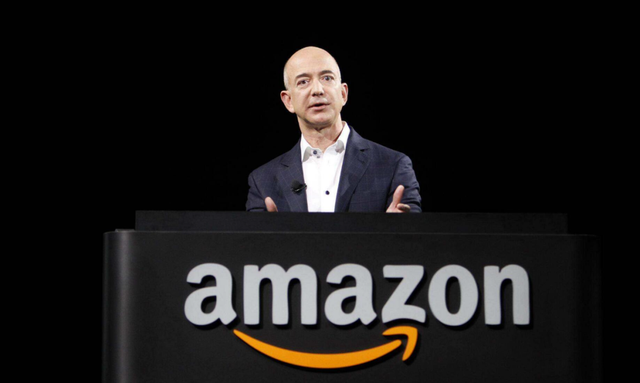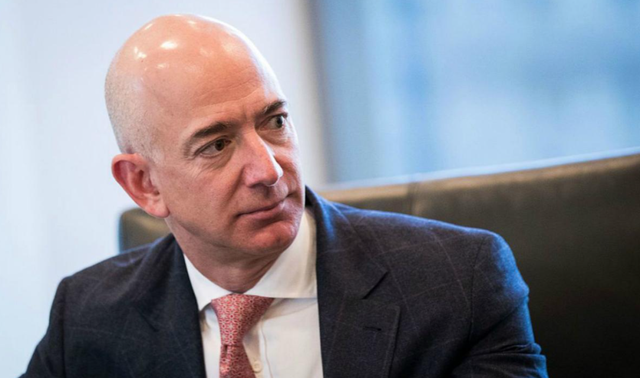Billionaire Jeff Bezos has applied certain principles in life and work to achieve good results.

The person comparable to billionaire Elon Musk – founder of Tesla must be Jeff Bezos, founder of Amazon. In 1994, Jeff Bezos, 28 years old, was surfing the Internet when he happened to see the number 2300%, which was the annual growth rate of global Internet users at that time. Bezos’ eyes began to light up and then a strong idea began to arise: He wanted to start a company that sold books on the Internet.
At the time, Jeff Bezos was Senior Vice President of DEShaw & Co, the most advanced and successful hedge fund trading management firm on Wall Street, with an enviable income and status. Immediately, he shared it with his boss, who advised him to spend 48 hours thinking about it. And then, Jeff Bezos decided to act or he would regret it. He chose a seemingly risky path to pursue his passion and ideals.

Three years later, the online bookstore he founded called Amazon became the largest bookstore on the Internet and later became the largest online retailer of music products in the United States, the largest online retailer, …
When running Amazon, the billionaire demonstrated extraordinary leadership abilities. Especially at a time when the company was continuously losing money, he focused on core business activities, while continuing to invest in technology, infrastructure and talent team. It is this strategic focus and long-term vision that has helped Amazon become the largest e-commerce company in the world, with high growth in cloud service revenue.
Jeff Bezos’ business achievements are not limited to Amazon, he also founded the space exploration company Blue Origin, acquired the Washington Post – a long-standing American media company and invested in a series of public companies. pioneering technology in the fields of electric vehicles, self-driving cars, AI,… Over time, the business seeds planted by Bezos can create miracles in the new business era.
Behind great achievements are great leaders. The founder of Amazon has life experiences and a very simple but inspiring business philosophy.

About life
1. I will imagine myself at 80 years old, looking back on my life and hoping that I have as few regrets as possible. And I won’t regret it even if I fail.
2. One piece of advice I would like to give to all young people: Think carefully about every choice. What determines your life is not your talent but every choice. Talent is of course a good thing, but what you strive to achieve is worth being proud of. Talent is a gift we are given, and what was really difficult for me was deciding to work hard, make the best use of my gifts, and do things that made me feel less comfortable. than.
3. You pay for the difference, but it’s worth it.
4. Many people believe that you should live in the moment. I think what you should do is think about the future and make sure you plan for it so that you can ultimately have a satisfying life.
5. Think about the people you admire in your life. Take them as role models. For me, I always try to only work with people I admire. I encourage employees to do the same.
6. Don’t ask others to trust you, it won’t work. The way to win trust is: first, do difficult things well; The second is to do it many times.
7. I believe that curiosity and exploration are a survival skill.
8. You can be yourself, but don’t expect it to be easy or free, you have to keep trying.
9. 80% of your happiness in life depends on who you choose to be with.
10. All successful entrepreneurs have a strong belief, that is, they believe that they can succeed. Even if you fail 5, 10 or even many times, don’t be afraid. Once you have identified your goals, continue working hard to achieve success.
11. The only way to get out of trouble is to find your own way out.
12. Ultimately, who we are is our own choice.
13. Stress mainly comes from being able to control something but not taking action.
14. Each of us has limited time. Where and how to spend your time is a high-leverage way of thinking.
15. If you haven’t gone through difficult times, it means you haven’t gone through real challenges.

About business
1. A good commercial product must have at least 4 characteristics: Preferred by customers, able to be developed on a large scale, highly profitable and sustainable.
2. Many companies make this mistake: When the market changes suddenly, they lose confidence and follow the latest wave.
3. Being customer-centric instead of competitor-centric will bring many benefits.
4. I often remind my employees to feel scared and wake up with fear every morning. We are not afraid of competition but of customers. Our company is what it is today thanks to our customers.
5. Raise customer expectations to improve service standards. If we can do that then it really makes sense.
6. You should spend 70% of your time creating a great customer experience and 30% of your time creating it.
7. I’m often asked a question: “What will change in the next 10 years?”. But I’m rarely asked “What won’t change in the next 10 years?”. I think the second question is more important because you need to build a strategy based on the things that don’t change. It’s an interesting principle to invest all your resources into something that doesn’t change.
8. I once asked Buffett: “Your investment philosophy is very simple, why can’t others do the same thing as you?”. Buffett said: “Because no one wants to get rich slowly.”
9. It’s easy to get ideas. But turning an idea into a successful product is difficult. There are many steps to go from idea to result and it requires perseverance.
10. One of the most important rules of business: Complaining is not the answer. Optimism is an essential quality when doing anything. This doesn’t mean you have to be blindly optimistic or unrealistic. What I mean is that you have to constantly focus on eliminating risk and adjusting the strategy until it feels right.
11. Doing things at speed is the best defense for the future. If you get closer to the future, you will be a winner.
12. We live in a complicated world and if you know how to make things simpler and easier for people, they will appreciate what you do.
13. If you look back, we were called “Amazon is dead”, “Amazon’s scam” and “Amazon’s bomb” in the first 3 years of the company. That’s what I’m trying to say: Be willing to be misunderstood. I believe that if you want to innovate, you must be willing to be misunderstood for a long time. If you can’t accept it, then don’t do anything. You can only defeat your opponents by adopting a “non-consensus but correct” perspective.
14. If you never want to be criticized, don’t do anything innovative.
15. Taking a detour isn’t so bad. We also have products like the Fire Phone that don’t work very well. There are too many failed experiments to list them all. But there is no 1001st success without a 1000th failure.
16. I’ve been making mistakes my whole life. Everyone in the corporate world knows this: I’ve always had a stigma about failure. But I think what makes us different is the way we deal with failure. Failure and innovation are inseparable twins.
17. For a company, a brand is like a personal reputation. It’s hard to gain reputation and easy to lose it. And to us, brand reputation is much more valuable than money.
18. If what you do can’t get people talking, it will be difficult to create word of mouth.
19. Whether in life or work, the best decisions I make are based on my heart, taste, intuition and courage.
20. Whenever we are faced with a problem that keeps us in an endless loop and prevents us from making a decision, ask the question: “What would be better for the customer?”.
21. Most decisions can be made as long as you have about 70% information. If you wait until you have 90% of the information before making a decision, in most cases you can be late.
22. After every failure, we ask ourselves: “Do you still believe in this vision?”. If we have strong faith, it will help to search for new methods.
23. I am rarely drawn into daily work. I start working for the next 2 – 3 years. Most of my leadership team has a similar arrangement. Friends congratulated me after Amazon reported its quarterly earnings and said: “Great job, it was a great quarter.” I would say, thank you, but this quarterly report was forecast three years ago.
24. My rule of thumb is: be stubborn in the big things and flexible in the small details.
25. The most powerful weapon of traditional business is: location. The most important thing is: technology.
About system organization talent
1. As an executive, if you are not confident enough to recruit excellent talent, don’t expect to become stronger.
2. Working at Amazon is not easy. In interviews, I tell candidates: “You can work overtime, work hard, or work smart, but at Amazon, you have no choice. You have to do all three.” .
3. Talent is our most important resource. All companies want to hire the best talent, and Amazon is committed to helping people reach their potential.
4. If you want to work for a long time, it’s important to surround yourself with interesting people.
5. At Amazon, we believe that only a unique combination of talents can create unique products.

About corporate culture
1. Seriousness and excitement are not contradictory, you can definitely do both. This is what we strive to do and is our greatest achievement.
2. People in our company like to be creative, so other creative people will be attracted here, and people who don’t like to be creative will feel uncomfortable here. Therefore, the company constantly improves itself.
3. Don’t be complacent. One way to do this is to maintain a beginner’s mind. Have this mentality: You are new to the game and someone you don’t know is providing a better service or product.
4. In business, you should not brag about your achievements, regardless of the reason.
5. My main job is to try to help maintain a company culture of high standards of operational excellence, creativity, and a willingness to fail and challenge boldly. I am the company’s “balancer” and can say “yes” to the organization’s “no’s.”





